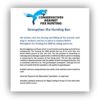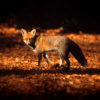 http://www.bbc.co.uk/iplayer/episode/b013n4bf/The_Radio_Wales_PhoneIn_23_08_2011/?t=28m48s Listen to the radio article here on iplayer.
http://www.bbc.co.uk/iplayer/episode/b013n4bf/The_Radio_Wales_PhoneIn_23_08_2011/?t=28m48s Listen to the radio article here on iplayer.
On BBC Radio Wales August 23rd 2011, Conservative anti hunting MP Caroline Dinenage spoke for the 75% of the majority of the public who are against hunting with dogs as demonstrated in the Ipsos MORI poll conducted in 2009. She is in touch with the spirit of the times where the general public is increasingly less tolerant of unnecessary sports involving live animals as a focus of recreation.We applaud MPs who demonstate strength of character and stand by their convictions.
The radio interview also included a contribution by pro hunting MP Glyn Davies and Suzanne Campbell of POWA.All the phone in contributors from the general public were against fox hunting.
It is indeed a minority sport and deserves no place in the 21st century. The pro hunting fraternity either call hunting with dogs, a sport or ‘wildlife management’. Whichever label they feel most comfortable in labeling this now illegal and banned activity does not detract from the fact that it is unnecessary to chase a wild animal to it’s death to be ripped apart by hounds in the present day as the focus of a recreational social activity.
The ‘Wildlife Management’ description bandied by some pro hunters does not compare with the model of the ‘Natural Chase’ of a predator chasing it’s prey in the wild since a pack of wild wolves would not expend the enormous energy and time to chase one lone animal as small as a fox as it would not provide enough food for the pack. The kennel fox hounds pack also has other unfair unnatural advantages denied to a wild predator as they are afforded veterinary treatment in their kennels for any illness or ailment unlike a wild predator. Only the strongest and fittest hounds are allowed to participate in the activity, unlike in the wild where sick or aged predators hunt to survive . Many pack hounds retire from working life at age 5, 6 or 7 years old. As soon as they slow down they are withdrawn from the pack. Furthermore, in the wild if a fleeing fox goes to ground it has the opportunity to escape into it’s fox earth underground. In traditional fox hunting, fox earths were sometimes blocked and entrances netted to prevent the fox from escaping to it’s natural sanctuary. If it did indeed escape to some unblocked earth, it would sometimes be dug out by men and terriers sent underground to dig it out and throw it to the waiting hounds.Terrier dogs would also suffer huge injuries from a fox fighting for it’s life underground. It is important to remember that a fox is a wild member of the dog family and we would not accept dogs being set upon dogs as in dog fighting and it is not acceptable for a dog to be set upon another wild mammal or a wild dog member such as a fox in a social activity. It is unacceptable for most people for a sport to be made out of an animals suffering, be it dog fighting or bull fighting etc in modern times.
It is important to remember that the ban also protects stags and hares from hunting with dogs and the cruel ‘sport’ of hare coursing. MPs who vote for repeal may need to examine why they feel that the RSPCA, and all our animal welfare organisations lobby the government to protect the ban. These organisations are all recognised for their campaigns for other forms of animal protection- then why should there be a blind spot or a refusal to follow their expertise on this particular issue of hunting with hounds?
http://www.guardian.co.uk/uk/2002/feb/17/hunting.ruralaffairs Wildlife Management? Read the full article on the link provided as reported in the Guardian newpaper in 2002.
Hunters ‘breeding foxes’ to provide for the kill
Concrete chambers used as ‘artificial earths’ to ensure supply of animals for blood sport
The following writing was written in the above article on the link provided in February 2002 when traditional fox hunting was legal: ‘Hunts across the country are breeding foxes in specially made dens to ensure an adequate supply of the animals, undermining claims that they are killed only in the name of pest control.The ‘artificial earths’ are built on the territory of more than 50 hunts, from the Isle of Wight to Cumbria, including some of Britain’s most prestigious such as the Quorn and Beaufort hunts.’
It would be interesting to hear the pest-control explanation and justification for cutting off the tails and ears of foxes as trophies or for smearing the blood of a dead fox onto the face of a child as an initiation ceremony
http://www.league.org.uk/content/323/What-s-Wrong-with-Hunting-More on the practice of’blooding’ children in fox hunting
‘When the fox is dead, most hunts cut off the tail (‘brush’), the feet (‘pads’) and the head (‘mask’) as trophies. The carcass is then thrown to the hounds. Some hunts also indulge in the practice of ‘blooding’ – the smearing of fresh fox blood on the faces of those, usually children, who have witnessed their first kill.
‘
Hunting hares with dogs and hare coursing cannot be classified as pest control or wildlife management’ when the hare population are an endangered species and the government in 1996 initiated a Biodiversity Action Plan to double their populations by 2010. According to the Hare Preservation Trust hare numbers have not improved at all at the end of this period and their populations are critically declining. There are only approximately 730,000 wild hares left compared to 37 million wild rabbits in Great Britain .How would a return to hunting with dogs or hare coursing improve their vulnerable status?






